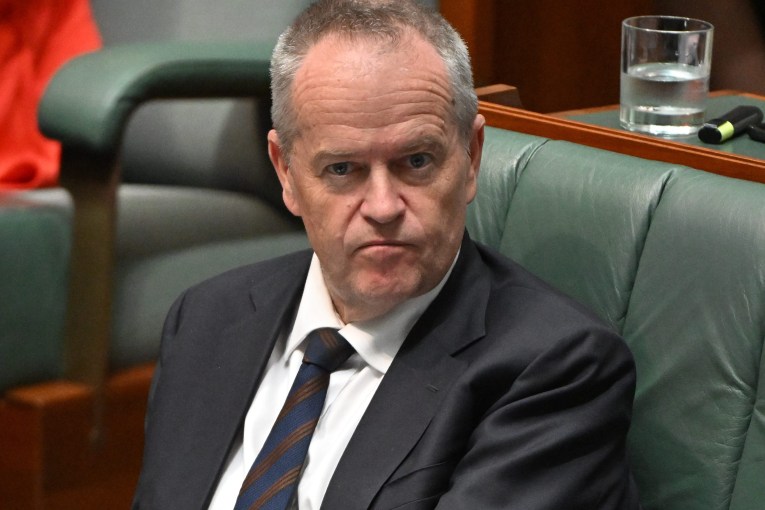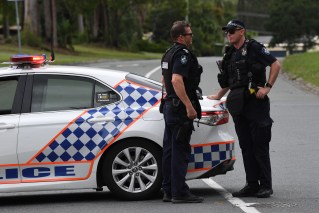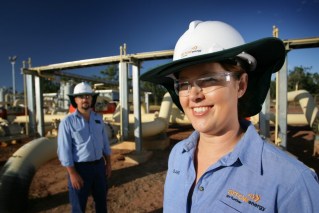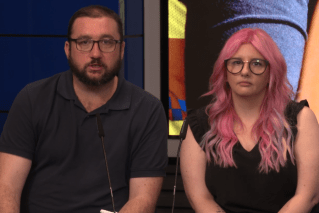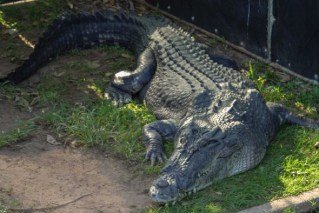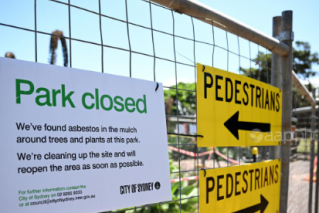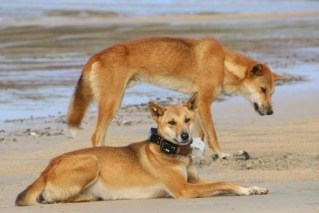Tiny Queensland community that’s the last bastion for a shrinking culture
It is one of the few surviving communities in Australia where their native language is still spoken at home – but Aurukun is more relevant to Queensland business and politics than you might imagine, writes Marty Silk
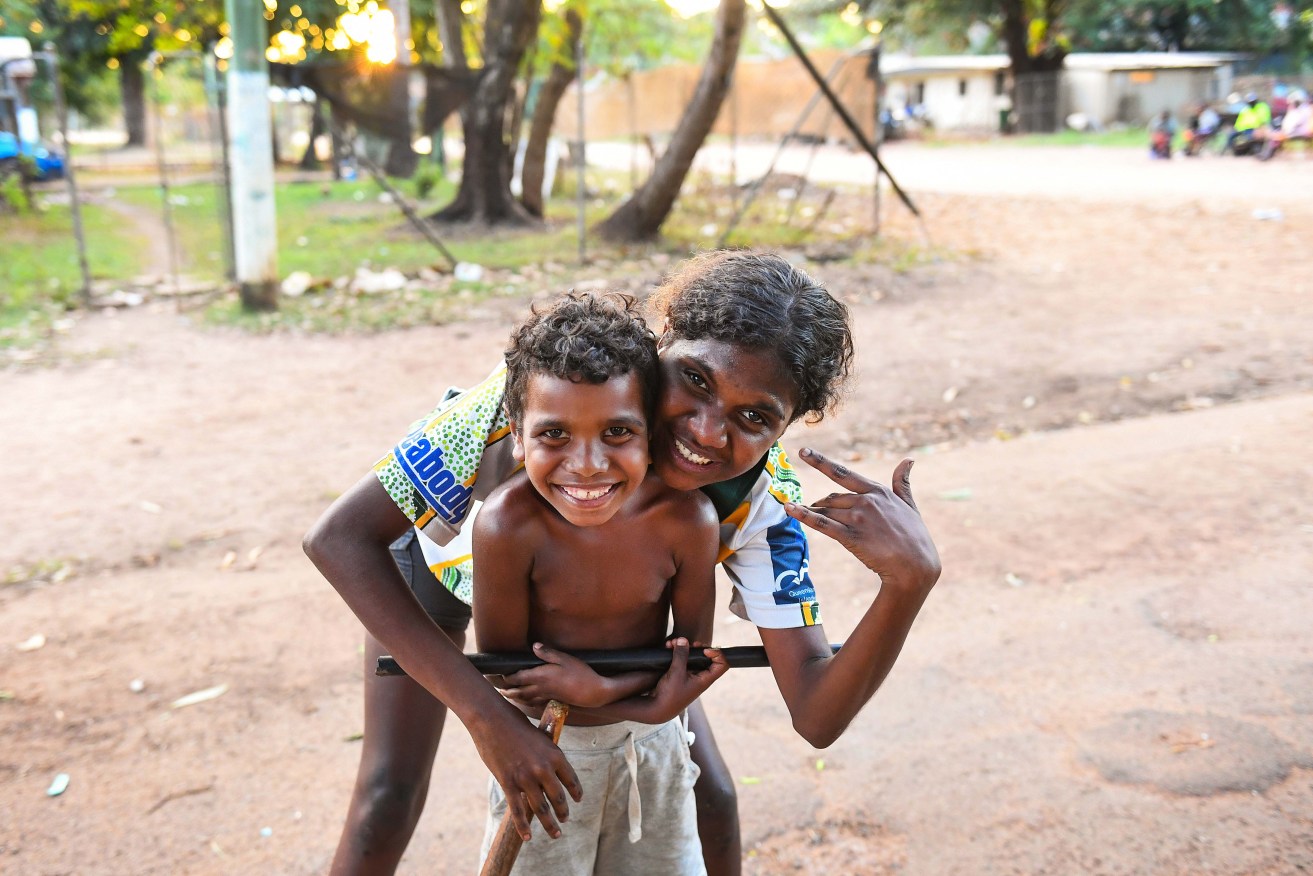
***Hold For Saturday*** Local children pose for a photo while they play stick ball in a street in Aurukun in far North Queensland, Cape York, Tuesday, July 19, 2022. A group of Aurukun locals are turning to their Wik roots to rejuvenate the Indigenous community 40 years after the traumatic takeover of their idyllic Cape York homelands. (AAP Image/Jono Searle) NO ARCHIVING
A lot of uninvited guests have been turning up at Aunty Martha Koowarta’s door in Aurukun recently. But the veteran Indigenous land rights campaigner has turned all of them away from her modest house in Queensland’s western Cape York.
“They want to do mining, but I have to be strong all the time – I won’t let anyone do mining,” Aunty Martha tells AAP.
The softly spoken grandmother says surveyors have been spotted in her late husband John Koowarta’s ancestral homelands, south of the Archer River.
“Your colour try to grab that place,” she says of the white interlopers, while slowly dragging on a cigarette.
The octogenarian and her late husband have been fighting state attempts to open Wik lands to bauxite mining since the 1970s.
When Joh Bjelke-Petersen blocked Mr Koowarta from buying his traditional lands back from a pastoral company, he took the former premier to the Federal Court and won in 1982.
The state then turned the land into a national park to shut Koowarta out.
That case set a precedent for federal anti-discrimination cases, paving the way for the Mabo native title decision in 1992.
Four years later, the Wik people were granted native title over their lands.
In 2009, Aunty Martha won her court case against the Bligh government’s controversial Wild Rivers Declarations, which would have locked up her late husband’s territory. But she fears the mining companies are circling again and will move in when her generation dies out.
It’s already near impossible for people to resist mining: under Queensland law, even traditional owners are obligated to strike deals.
Rio Tinto is mining vast bauxite reserves in the Wik-Way homelands, north of Aurukun, and a Glencore-Mitsubishi joint venture is in talks for a similar project.
Aunty Martha believes the only reason company representatives are trying to get her permission is to avoid bad publicity.
In fact, the slow incursion of mining into Wik lands has shaped local history for more than four decades.
Before then, the Wik Nation was part of the Aurukun Aboriginal Reserve, officially administered by the Uniting Church.
In reality the church handed most power back to the Wik, who elected a council to run the reserve.
But under then premier Bjelke-Petersen, the state took over the reserve in 1978 – despite Wik protests – and set up its own Aurukun council. In 1985, the government forced the council to open a wet canteen to raise funds, introducing many Wik people to alcohol for the first time.
Aurukun residents have since suffered decades of addiction, violence and poverty.
Yet the Wik have managed to hang onto their language and culture.
Today there are no passport controls for visitors crossing into the Wik Nation, but there might as well be.
Hardly anyone owns a car and most people walk barefoot in the main settlement of Aurukun.
Even in winter, the noon sun slows everything down in town as even the numerous stray dogs seek shade under towering fruit trees and palms.
On straw-dry lawns, strewn with empty cans and litter, locals yarn around roaring campfires in 32C heat.
Aurukun is far closer to Port Moresby in appearance and geography than it is to Brisbane. The odd English word is spoken in the supermarket or outside the police station, but Wik-Mungkan is the language of the street.
Aurukun is also one of the last places in Australia where most people speak an Indigenous language at home.
Whenever someone dies, the whole community still goes into mourning – known as “sorry business” – until the burial.
While Wik traditions and lore are honoured, state laws aren’t held in the same regard.
Police laid 1700 charges – mostly for assault, domestic violence order breaches and property damage – in the community of only 1100 in the year to June.
Aurukun’s officer in charge, Senior Sergeant Amit Singh, thinks fostering Wik culture will help make the community more peaceful.
He wants to encourage locals to take disputes to their elders and mediators before they erupt into street fights.
“It’s about changing people’s thinking,” Snr Sgt Singh tells AAP.

Aurukun Officer in Charge Senior Sergeant Amit Singh is seen at Aurukun police station, in far North Queensland,. . (AAP Image/Jono Searle)
The gregarious, towering Indo-Fijian-Australian is also trying to repair frayed ties between the community and police.
He’s pushing officers to learn Wik words, like “wanttak” for hello and “appow” for goodbye, to communicate better.
“In Fiji people walk around saying ‘bula’, it doesn’t matter who you are, you gotta say ‘bula’ back,” he says. “But when people come into Indigenous communities, they don’t do that.
“There’s a language here and speaking it is a very good way to connect and show respect.”
Singh often finds himself using the word for “be quiet” – popam – when he’s trying to break up fights.
“When people are yelling and carrying on, and you rock up and say ‘popam’, at first they go, ‘oh, you just used our language’ and they start talking about that,” he says.
The focus is on talking rather than blunt law enforcement, which has triggered full-blown riots in Aurukun in the past.
“Ninety per cent of policing starts and stops here,” he says, pointing to his mouth.
Since the state takeover more than 40 years ago, youth crime has also exploded in Wik lands.
Only half of Aurukun’s primary school-aged children turned up for class in 2021, while the figure was only one in three for those old enough for high school, according to state government statistics.

Local children play stick ball in a street in Aurukun in far North Queensland, Cape York, Tuesday, July 19, 2022. A group of Aurukun locals are turning to their Wik roots to rejuvenate the Indigenous community 40 years after the traumatic takeover of their idyllic Cape York homelands. (AAP Image/Jono Searle)
Aunty Koowarta says young people need more activities to keep them out of trouble.
“Instead of going round with the stick and bricks, how about if they can do something else?” she says.
The PCYC recently formed a youth club offering activities like futsal or ways to earn money by washing cars.
Singh says it’s important for children to connect with their Wik culture.
“They think being African American is cool culture – that’s not their culture, their culture is older and cooler than that,” he says.
Noel Waterman, who grew up in Melbourne, runs the council-funded Aurukun Indigenous Knowledge Centre. Despite a limited budget, he supports Wik elders to teach local kids about their stories and lore.
“At its heart it’s a genuine, authentic, spiritual Woyan-min – good way – that keeps the people healthy,” Mr Waterman says.
“Otherwise, they’ll end up like lots of people around Australia where their culture’s lost.”
Aurukun Shire Council is also trying to help people visit remote outstations in the south. The region is one of Cape York’s last unspoilt wilderness areas, abundant with fish, birds and crocodiles.

Local indigenous rangers moor at the ramp at dawn in Aurukun. A group of Aurukun locals are turning to their Wik roots to rejuvenate the Indigenous community 40 years after the traumatic takeover of their idyllic Cape York homelands. (AAP Image/Jono Searle)Visiting is difficult because roads are in poor condition and transport is limited.
Outstation journeys are spiritual for the Wik, but they also serve a legal purpose – native title can be extinguished if Indigenous owners don’t maintain a continual connection with their land.
Aurukun local Janet Koongotema, 83, wishes she could go south more often and also hopes her people can protect the lands from mining.
“You can see a river or small creek like that, you can go down, get a (fishing) line,” the Wik elder tells AAP.
“It’s there you can see crabs, crawling at low-water time … it’s really good, you know.”
This AAP article was made possible by support from the Meta Australian News Fund and The Walkley Foundation
